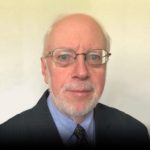Thomas Hargrove I Reducing the Odds of Murder

Thomas K. Hargrove is a retired Washington, D.C.-based investigative journalist and former White House correspondent. He founded the nonprofit Murder Accountability Project in 2015 to track unsolved homicides nationwide. While working as a national correspondent for the Scripps Howard News Service, Hargrove developed an algorithm that uses FBI homicide data to identify clusters of murders with an elevated probability of containing serial killings. Authorities in Youngstown, Ohio, and Gary, Indiana, opened new homicide investigations in 2010 as a result of Hargrove’s findings. The algorithm’s identification of 15 unsolved strangulations in Gary was corroborated in 2014 with the arrest of Darren Deon Vann, who confessed to killing women for decades.
Working with fellow board member Prof. David J. Icove of the University of Tennessee, Hargrove developed another algorithm that can review the National Fire Incident Reporting System to identify undetected or unreported arsons. Working with Professor Guido H. Stempel III of Ohio University, Hargrove co-founded the Scripps Survey Research Center and co-edited a two-volume encyclopedia, The 21st Century Voter: Who Votes, How They Vote and Why They Vote, published by ABC-CLIO in late 2015.





